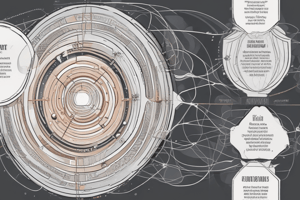Podcast
Questions and Answers
What is the primary focus of Motivational Theories in addressing employee issues?
What is the primary focus of Motivational Theories in addressing employee issues?
- To emphasize the importance of extrinsic motivation
- To identify and address discrepancies between employee needs, values, and wants (correct)
- To design achievable goals and provide feedback
- To highlight the differences between employee needs, values, and wants
According to Maslow's Hierarchy of Needs, what is the highest level of need?
According to Maslow's Hierarchy of Needs, what is the highest level of need?
- Ego Needs
- Transcendental Needs (correct)
- Social Needs
- Self-Actualization Needs
What is the primary purpose of providing feedback on goal progress?
What is the primary purpose of providing feedback on goal progress?
- To reduce employee turnover
- To increase employee satisfaction with their job
- To improve employee motivation and performance (correct)
- To enhance employee self-determination
What is the concept of skipping levels in the ERG Theory?
What is the concept of skipping levels in the ERG Theory?
What is the primary concept of Self-Regulation Theory?
What is the primary concept of Self-Regulation Theory?
What is the underlying theory behind the use of rewards for achieving goals?
What is the underlying theory behind the use of rewards for achieving goals?
What is the key principle in timing of incentive or punishment?
What is the key principle in timing of incentive or punishment?
What is the purpose of contingency of consequences?
What is the purpose of contingency of consequences?
What is the Premack Principle?
What is the Premack Principle?
What is the purpose of individual-based incentives?
What is the purpose of individual-based incentives?
What is the purpose of equity theory?
What is the purpose of equity theory?
What affects the motivation of colleagues?
What affects the motivation of colleagues?
What is the purpose of punishment in organizational development?
What is the purpose of punishment in organizational development?
What is the significance of substitution of reward programs with punishment programs?
What is the significance of substitution of reward programs with punishment programs?
What is the primary purpose of the initial rapport during a performance appraisal interview?
What is the primary purpose of the initial rapport during a performance appraisal interview?
What is the fundamental attribution error in the context of performance appraisal?
What is the fundamental attribution error in the context of performance appraisal?
What is the primary focus of the job characteristics theory?
What is the primary focus of the job characteristics theory?
What is the Galatea Effect in the context of self-esteem?
What is the Galatea Effect in the context of self-esteem?
What is the primary difference between intrinsic and extrinsic motivation?
What is the primary difference between intrinsic and extrinsic motivation?
What is the primary focus of the need for achievement in the context of employee motivation?
What is the primary focus of the need for achievement in the context of employee motivation?
What is the primary purpose of self-esteem workshops in the context of employee motivation?
What is the primary purpose of self-esteem workshops in the context of employee motivation?
What is the primary focus of the consistency theory in the context of self-esteem?
What is the primary focus of the consistency theory in the context of self-esteem?
Flashcards are hidden until you start studying
Study Notes
Job Characteristics Theory
- Employees desire meaningful jobs, opportunities to be responsible for the results of their work, and feedback on the outcomes of their efforts.
- Discrepancy between an employee's needs, values, and wants can lead to demotivation.
Motivational Theories
- Maslow's Hierarchy of Needs: Basic Biological Needs, Safety Needs, Social Needs, Ego Needs, Self-Actualization Needs, and Transcendental Needs.
- ERG Theory: Three levels of satisfaction (Existence, Relatedness, and Growth), can skip levels.
- Two-Factor Theory: Hygiene Factors (Necessities) and Motivators.
Self-Determination Theory
- Emphasizes the relevance of intrinsic motivation for persistence and task enjoyment.
Employee Goals
- Achievable Goals (SMART goals).
- Feedback on their goal progress increases effectiveness of goal-setting (verbally, charts, non-verbal communication).
- Rewards for achieving goals (providing incentives to employees).
Self-Regulation Theory
- Employees monitor their own progress.
- Management of impulses.
Rewards and Punishment
- Operant Conditioning: Timing of the incentive, Contingency of Consequences, Type of Incentive Used, and Individual Vs Group Incentives.
- Rewards Vs. Communicating Appraisal Results.
Factors Affecting Employee Motivation
- Employee Predisposition (Self-Esteem, Intrinsic Motivation, Needs for Achievement and Power).
- Meeting of Employee Values and Expectations (Job Expectations, Job Characteristics, Needs Values and Wants).
- Employee's Goals (Achievable Goals, Feedback, and Rewards).
- Equal distribution of rewards and resources (Equity Theory).
- Motivation of Colleagues (healthy working environment).
Employee Predisposition
- Self-Esteem: Consistency Theory (Chronic Self Esteem, Situational Self Esteem, Socially Influenced Self-Esteem), Addressing Self Esteem Issues (Self-Esteem Workshops, Experience with Success).
- Intrinsic Motivation: internal rewards, Extrinsic Motivation: external rewards.
Needs for Achievement and Power
- Need for Achievement: motivation is based on accomplishments and overcoming challenges.
- Need for Affiliation: motivation is based on a person's need to be connected with people.
- Need for Power: motivation is based on the wanting to influence others or outcomes.
Studying That Suits You
Use AI to generate personalized quizzes and flashcards to suit your learning preferences.




